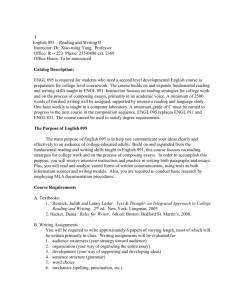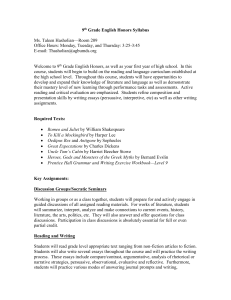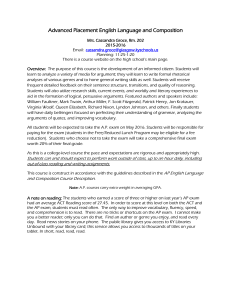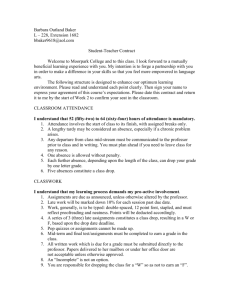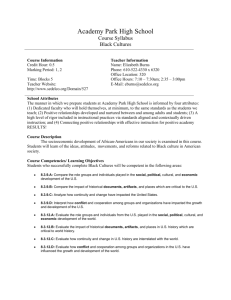ENGLISH 202C-003 EFFECTIVE WRITING: TECHNICAL WRITING
advertisement
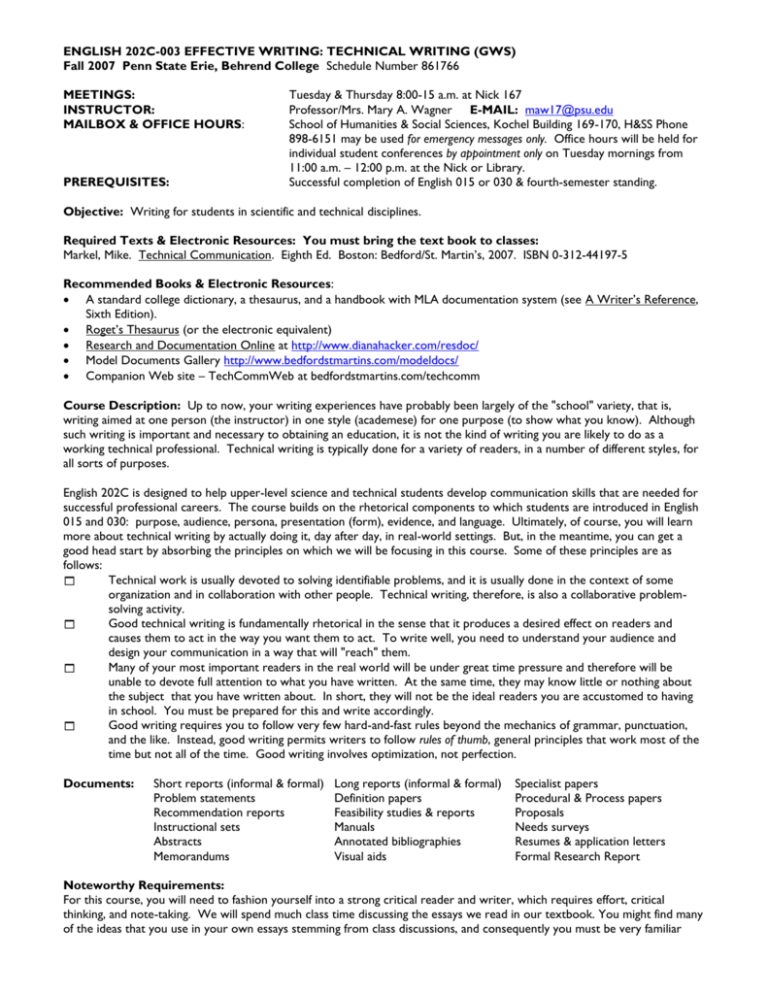
ENGLISH 202C-003 EFFECTIVE WRITING: TECHNICAL WRITING (GWS) Fall 2007 Penn State Erie, Behrend College Schedule Number 861766 MEETINGS: INSTRUCTOR: MAILBOX & OFFICE HOURS: PREREQUISITES: Tuesday & Thursday 8:00-15 a.m. at Nick 167 Professor/Mrs. Mary A. Wagner E-MAIL: maw17@psu.edu School of Humanities & Social Sciences, Kochel Building 169-170, H&SS Phone 898-6151 may be used for emergency messages only. Office hours will be held for individual student conferences by appointment only on Tuesday mornings from 11:00 a.m. – 12:00 p.m. at the Nick or Library. Successful completion of English 015 or 030 & fourth-semester standing. Objective: Writing for students in scientific and technical disciplines. Required Texts & Electronic Resources: You must bring the text book to classes: Markel, Mike. Technical Communication. Eighth Ed. Boston: Bedford/St. Martin’s, 2007. ISBN 0-312-44197-5 Recommended Books & Electronic Resources: A standard college dictionary, a thesaurus, and a handbook with MLA documentation system (see A Writer’s Reference, Sixth Edition). Roget’s Thesaurus (or the electronic equivalent) Research and Documentation Online at http://www.dianahacker.com/resdoc/ Model Documents Gallery http://www.bedfordstmartins.com/modeldocs/ Companion Web site – TechCommWeb at bedfordstmartins.com/techcomm Course Description: Up to now, your writing experiences have probably been largely of the "school" variety, that is, writing aimed at one person (the instructor) in one style (academese) for one purpose (to show what you know). Although such writing is important and necessary to obtaining an education, it is not the kind of writing you are likely to do as a working technical professional. Technical writing is typically done for a variety of readers, in a number of different styles, for all sorts of purposes. English 202C is designed to help upper-level science and technical students develop communication skills that are needed for successful professional careers. The course builds on the rhetorical components to which students are introduced in English 015 and 030: purpose, audience, persona, presentation (form), evidence, and language. Ultimately, of course, you will learn more about technical writing by actually doing it, day after day, in real-world settings. But, in the meantime, you can get a good head start by absorbing the principles on which we will be focusing in this course. Some of these principles are as follows: Technical work is usually devoted to solving identifiable problems, and it is usually done in the context of some organization and in collaboration with other people. Technical writing, therefore, is also a collaborative problemsolving activity. Good technical writing is fundamentally rhetorical in the sense that it produces a desired effect on readers and causes them to act in the way you want them to act. To write well, you need to understand your audience and design your communication in a way that will "reach" them. Many of your most important readers in the real world will be under great time pressure and therefore will be unable to devote full attention to what you have written. At the same time, they may know little or nothing about the subject that you have written about. In short, they will not be the ideal readers you are accustomed to having in school. You must be prepared for this and write accordingly. Good writing requires you to follow very few hard-and-fast rules beyond the mechanics of grammar, punctuation, and the like. Instead, good writing permits writers to follow rules of thumb, general principles that work most of the time but not all of the time. Good writing involves optimization, not perfection. Documents: Short reports (informal & formal) Problem statements Recommendation reports Instructional sets Abstracts Memorandums Long reports (informal & formal) Definition papers Feasibility studies & reports Manuals Annotated bibliographies Visual aids Specialist papers Procedural & Process papers Proposals Needs surveys Resumes & application letters Formal Research Report Noteworthy Requirements: For this course, you will need to fashion yourself into a strong critical reader and writer, which requires effort, critical thinking, and note-taking. We will spend much class time discussing the essays we read in our textbook. You might find many of the ideas that you use in your own essays stemming from class discussions, and consequently you must be very familiar with the textbook essays to talk about those essays and to write successful essays of your own. You must also be present both in body and spirit for class discussions so you can contribute to them. I take attendance; see my expectations in the section on policies for attendance and participation. For ENGL 202 C, you will be required to write five projects or documents and one research project. For each of these projects, you will be asked to complete an initial version or rough draft and then to revise that rough draft into a final version of the essay, aptly called a final draft. These projects will be graded for their content and their style, the quality of your argument, and the clarity of your writing. Failure to complete a first draft of a project will result in a grade of zero for the draft assignment and will significantly lower the grade on your final draft of that project. The research project will be a research document and will require you to conduct substantial library research. To help you in that effort, our class will meet with a reference librarian, who will offer instruction in doing the sort of research required for this project and for similar projects that you'll be doing during your college career. We will spend class time discussing, evaluating, and responding to each other's work. This process is called peer revision and editing or peer response. You are expected to attend workshops to complete this work and to have available your own essays for such revision and editing when they are called for. If you are unprepared for this work on the day when it is scheduled, you will be considered absent for that class period. You will also be evaluated on the peer responding and editing that you do; it's important to offer critical advice and help to other writers so all of you can improve your writing. Throughout the semester, you will also be asked to complete shorter writing assignments, usually in response to the readings in our textbook. These will generally be written outside of class, and all such work must be word processed; I will not accept handwritten versions of out-of-class assignments. All work must be handed in on time, which means the work that is due must be submitted on the day it is due and in class. Any major work turned in late will be penalized 10 points or one letter grade for each day it is late. Any other out-of-class writing that is turned in late (when that is permitted by the instructor) will be penalized in accordance with the point value of that work. You must turn in all writing and homework in hard copy form. Please do not e-mail your work to me. Producing legible, printed versions of your written work is your responsibility, not mine. Important Policies & Guidelines: 1. Attendance and class participation are mandatory and form part of your grade for the course. You are expected to come prepared to every class and to bring your text to every class. You should arrive at class on time and be prepared to participate in the activities. If you come to class without being prepared--without having done the reading, writing or other assigned work--or if you come to class late, you will be considered absent for that day. 2. Class & Workshop Attendance: ENGL 202 C includes writing-intensive workshops and practice exercises, both which require your attendance and effort. Written roll will be taken during each class, and you are expected to be here for every class. If you miss more than three credit hours of class time, I may ask you to leave the course. You will reduce your course grade by several points for each class you miss. You are allowed three credit hours of absences over the course of the semester. Use your absences wisely for serious illness or unavoidable misses. After three credit hours of unexcused absences, a student's assignments will not be accepted for evaluation or grading by the instructor. Absences of more than three credit hours will be treated according to University Policy. For more information, refer to Penn State Policies and Rules: A Handbook for Students," 42-27 Class Attendance." 3. Absences: What should you do in case you must be absent? Should you find it necessary to miss a class, you are responsible for obtaining and completing new assignments given that day. Be sure to make one or two contacts among your classmates so you can find out what you missed in case you are absent. If you miss a class, you are expected to stay current by contacting another student in your section of the course. Also, be sure to contact the instructor in case of a serious medical or family emergency so that arrangements can be made for your return to campus and completion of the course. 4. Excused absences are given in the following cases only: a sporting event for a school athlete (up to two events); severe illness or hospitalization of the student; or the death of an immediate family member. These cases merit an excused absence only when proper documentation is provided from Student Affairs and/or an appropriate authority (doctor, hospital administrator, coach or sport director). Those athletes who plan to miss more than three credit hours in class periods for events should arrange to take the course at another time or schedule themselves for a course which meets on different days. 5. Course Procedure: In this course, we will try to cover all of the basic principles of technical writing. But we do not want to simply lecture you; rather, we want you to learn by doing. To make this possible, we will be relying on you to keep up with the reading. The textbook provides comprehensive coverage of technical writing principles, accompanied by many sample documents, and should be fairly self-explanatory. You must do the assigned reading on schedule so that we can minimize the time needed for lecturing and devote more time than usual to discussion, small-group work, and critical thinking and writing practice. Methods: Lecture and Class Discussions, Quizzes & Exercises, Teacher-student Conferences, Revision & Editing, Workshops, Individual Reading of Text and Library Materials, and Independent Library & Field Work 6. Class Preparation: Prepare yourself for class discussions, activities, exercises, and tests administered during this course by attending classes, reading and annotating the assigned chapters, and participating actively in your own learning. Read and annotate the text book using your own unique method or by answering the following three questions for each assigned reading in your notebook: What are the three to five main ideas from the reading that seem most important to you?, What idea from the reading surprises you most?, and What question(s) do you have as a result of the reading? As you take notes, keep your focus on the class, reading, writing, and topics of special interest to you from your discipline. Class participation is critical in a course such as this because communication is a craft that is practiced differently in different contexts. Many of you have ideas and have had experiences that I hope you will share with the other people in the class. Contribute constructively to the course, even if by simply asking good questions. 7. Conduct: In addition to attending and participating in the classes, you must conduct yourself in a manner conducive to a learning environment in an academic setting. Criticisms should be constructive, not personal, and class work, not gossip, should be the focus when working in small groups. Turn off all electronic devices prior to entering the classroom. Cell phones, text messaging and listening devices (iPod, MP3, etc.) are prohibited. Additionally, just as you are expected to behave as ladies and gentlemen in the working world, you are also expected to behave in a civilized and proper manner in this writing classroom. Your classmates and I expect no talking during lectures, no fighting or profanity, no spitting, no hitting, no sleeping, no loud or offensive noises, no slouching on chairs, no throwing of objects, or like actions. Most students enjoy writing for ENGL 202 C. Your good preparation, positive attitude, gracious behavior toward classmates, and willingness to work collaboratively in our class should help you to write effectively and become accustomed to the work environment you will encounter after graduation. 8. Practical Advice: Keep copies of all work done in this course, including rough drafts and revisions. You should save your work in TWO places, such as on your computer’s hard drive and on a disk or as a paper copy and a disk copy. If you lose your work, you may have to re-write from the beginning to create the necessary “paper trail”; at best, you will have to rewrite at least one draft. Unnecessary re-writes generally result in lost points due to poorly written or late papers. 9. Late Work: All work must be completed on time. Late essays will be penalized one letter grade for each day the essay is late (including weekends and holidays). All four essays and the research project must be completed. Even if you know you will receive a failing grade on an essay, the essay must be turned in or you will fail the course. Also, be sure to bring your text book to each class meeting. 10. The Learning Resource Center: The LRC can help you to develop your writing, conquer especially difficult problems with particular skills, or tailor a study session that specifically meets your needs. To use the LRC, schedule an appointment with a peer tutor on the sign-up sheet at #203 Lilley Library, Kochel Building, or call (814) 898-6140. Always take a copy of your assignment and the developmental materials you have produced to a scheduled appointment. Extra credit for the assignment is assigned to the student who uses the LRC and sends a tutor’s log to the instructor. Although tutors in the LRC do not "correct" your papers, they can help you learn how to improve your own writing by offering assistance with planning, drafting, and revising. To meet with a tutor, make an appointment. 11. Computer Use: Please be sure to use the Computer Center for your word processing and computer needs if you do not have access to a computer of your own. Your assignments should be completed with a word processor or computer. If you have not learned how to use computers yet, you should see the Computer Center personnel for help. 12. Plagiarism: Plagiarism means submitting the ideas or writing of someone else (whether that of another student or a published writer) as your own work. Plagiarism is considered cheating, and you will receive a failing grade in the course for doing so. You may, however, quote and paraphrase other writers briefly, as long as you clearly acknowledge the source in your writing. Plagiarism will result in automatic failure of the course. You are responsible for reading and understanding the definition of plagiarism in the University Faculty Senate Policy on Academic Integrity (49-20), which offers detailed information regarding the university's policy about academic dishonesty. In short, you may discuss your work with others, but the writing must be your own. Plagiarism, or any other form of academic dishonesty, will not be tolerated in this course. Violations of academic integrity will result in sanctions as outlined by PSU Behrend policy. 13. Assignments will be given during classes along with the due dates. All assignments are due on the date announced. None will be accepted or graded after that date. You must turn in all course exercises, quizzes, and assignments. This requirement includes work done during a given day in class. Failure to do so means you have not completed the course, and, consequently, you will not receive a passing grade or credit for the course. Make-up assignments, daily work, and quizzes will not be given. Assignments submitted without proper format or with excessive errors in spelling, grammar, or punctuation will be returned with a failing grade. For example, one spelling error on a final draft reduces the grade for that assignment by one letter grade, two spelling errors reduce the grade by two letter grades, and three spelling errors reduce the grade by three letter grades. Drafts and revisions must accompany each completed paper. 14. Grading: A total of 1,000 possible points can be earned in this course. Each assignment will be graded for content, grammar, and development and checked for significant revision (i.e., the “paper trail” of class assignments associated with each essay). Assignment Diagnostic 5 Writing Projects @ 100 points per Project 1 Writing Project using Research Participation, Exercises, Homework, and Chapter Quizzes Attendance (30 Classes @ 3.33 points) TOTAL Points -- (Pass/Fail) 500 200 200 100 1,000 Final grades will be determined by percentage. A grade of A or B reflects superior work; a grade of C reflects competent performance; a grade of D shows substandard work that requires improvement; and a grade of F shows unacceptable or failed work. Grading is based on the following scale: A is 94-100 A- is 90-93 B+ is 87-89 B is 83-86 B- is 80-82 C+ is 77-79 C is 70-76 D is 60-69 F is 59 or less. * Modification of Syllabus: I reserve the right to modify the syllabus at any time. As a student registered for this course, you are responsible for staying current with the syllabus, even if you do not attend a particular class during which a modification is announced. This syllabus was created by Professor Mary A. Wagner ENGL 202C Technical Writing Syllabus SCHEDULE FOR FALL 2007 T-TH CLASS MEETINGS This schedule is subject to change. The information below shows the tentative daily class schedule. Minor adjustments to the schedule will be announced in class. T TH 8/28 8/30 Syllabus and introduction to Diagnostic Chapter 1. Introduction to Technical Communication T TH 9/4 9/6 Chapter 2. Understanding Ethical and Legal Considerations Chapter 3. Understanding the Writing Process T TH 9/11 9/13 Chapter 4. Writing Collaboratively. Chapter 14. Writing Letters, Memos, and E-mails. Workshop T TH 9/18 9/20 Chapter 5. Analyzing Your Audience and Purpose APPENDIX: REFERENCE HANDBOOK Part C. Editing and Proofreading Your Documents Writing Project 1 due T TH 9/25 9/27 Chapter 6. Researching Your Subject. Chapter 7. Organizing Your Information Chapter 17. Writing Informal Reports. Workshop T TH 10/2 10/4 Chapter 11. Writing Effective Sentences. Chapter 8. Communicating Persuasively. Writing Project 2 due T TH 10/9 10/11 Chapter 9. Drafting and Revising Definitions and Descriptions Chapter 10. Writing Coherent Documents. Workshop T 10/16 TH 10/18 APPENDIX: REFERENCE HANDBOOK Part A. Skimming Your Sources and Taking Notes and Part B. Documenting Your Sources Chapter 16. Writing Proposals. Writing Project 3 due T TH 10/23 10/25 LIBRARY ORIENTATION – Meet at Lilley Library in Kochel LIBRARY WORKSHOP – meet at Lilley Library in Kochel to search for sources T TH 10/30 11/1 Chapter 18. Writing Formal Reports Workshop T TH 11/6 11/8 Workshop Writing Project 4 due T TH 11/13 11/15 Chapter 12. Designing Documents Chapter 19. Writing Instructions and Manuals T TH 11/20 11/22 THANKSGIVING BREAK NOVEMBER 19-25 THANKSGIVING BREAK NOVEMBER 19-25 T TH 11/27 11/29 Chapter 21. Making Oral Presentations. Workshop Chapter 15. Preparing Job-Application Materials. Writing Project 5 due T TH 12/4 12/6 Workshop Workshop T TH 12/11 12/13 Writing Project 6 due. Optional Presentations Overview of course This semester has 30 Class Meetings. This course does not have a final exam.
